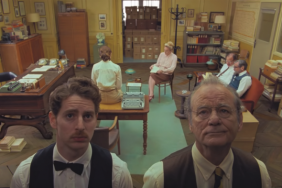Some view the films of Wes Anderson and see only the affectation, the twee attention to detail that sets them apart from reality and firmly into the realm of cinematic dioramas. But what makes them so emotional for the rest of us isn’t the worlds that these eccentric characters create for themselves, it’s what they create those worlds to escape from.
From the disillusioned twentysomethings of Bottle Rocket, fleeing into outlaw fantasies to avoid dealing with mundane real problems, to the pre-teen outcasts of Moonrise Kingdom who write their own epic romance to reject the loveless homelives of their parents, these unusual heroes refuse to accept the world as it is and make for themselves a fancier one that suits their egos even when it denies conventional truth. If you can’t find a parallel between these neurotics playing god and filmmakers, you’re not trying very hard.

Which is why Wes Anderson’s latest, The Grand Budapest Hotel, feels more than any of his other films like it was made exclusively for his fans. Its heroes aren’t as human as Max Fischer in Rushmore, or the Whitman brothers in Darjeeling Limited, because they aren’t creating their own stories. They are the characters in the story of a character in a story, far removed from the familiar spheres of personal experience and forced to rely entirely on the audience’s connection with the storyteller – any of them, but particularly Wes Anderson – in order to make a connection with the audience. They aren’t escaping from anything, they just live in a place that Anderson wants to take us. His motivations for doing so are what really matters.
That place is pure cork, a twisting caper about a hotel concierge named M. Gustave H. (Ralph Fiennes) who takes exquisite care of his clients, especially the elderly widows. When one of his octogenarian lovers dies, he brings his protégé Zero (Tony Revolori) along to the reading of the will, where the family is shocked to learn that Gustave has inherited a priceless painting. While the comically evil Dmitri Desgoffe-und-Taxis (Adrien Brody) seethes, Gustave and Zero abscond with the painting, setting in motion a series of events that leads to intrigue, prison breaks, bobsled chases and decapitation.

That last part may seem like a head scratcher, but Wes Anderson films have always had their fair share of violence. Attempted suicides and summer camp stabbings are par for the course, but Anderson never seemed to take this much glee in being repulsive before. The dangers in the world of The Grand Budapest Hotel are bizarre and unevenly malevolent, trumping this eclectic tale into something not entirely unlike a thriller, but also entirely unlike something that thrills. The jeopardy Gustave and Zero escape from over and over again is presented like a Tintin comic strip with just a hint of early Hitchcock, back when his sense of humor was more conversational and his sense of suspense was a lot more sardonic.
You could lose yourself in the details of The Grand Budapest Hotel, the specificity of the wallpaper and the delicacy of the delicious cakes. You could fall under the spell of its myriad cast of characters and their charms that masquerade as real characterization. But if you’re really going to lose yourself you should do so in the imagination of its author, who is so wrapped up in the artifice that the artifice can only be the point. Although Anderson toys with connections to the loss of civility between World War I and World War II, the real grand illusion is the one he invents to entertain himself against a truly important backdrop; a cinema of manners projected onto a time and culture that increasingly had none, told with characters as sharp as shadows but equally as thin.

But shadows are made by casting a light against something with three-dimensions. So, working backwards, The Grand Budapest Hotel does reveal some sort of meaning, if only about the person working their hands into funny shapes to tell the story. To the outsider it may not be worth the bother of figuring it out, but to his fans it’s an undeniably intriguing riddle. Is this what happens when Wes Anderson makes a copy of his own work, telling a story of affectation about a story of affectation? Is this his interpretation of an old-fashioned thriller, with the adventure itself a distraction from everything that really matters, even as those things poke their heads in from the periphery?
Fans will want to know. Fans will want to figure it out. Fans will certainly forgive Anderson if they never find The Grand Budapest Hotel’s emotional center, because they can easily get by on the luminous cast and Anderson’s contagious enthusiasm for putting them in harm’s way. It’s either his richest film or his most bankrupt, but for a filmmaker who repeatedly relies on the significance of avoiding anything serious in the first place, neither seems like a much of a problem.

William Bibbiani is the editor of CraveOnline’s Film Channel and co-host of The B-Movies Podcast. Follow him on Twitter at @WilliamBibbiani.








